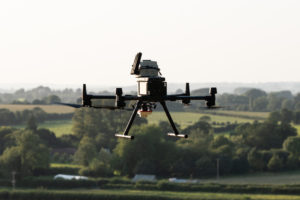5G RuralDorset’s farming use cases take shape

Hector Gibson Fleming, CEO of Wessex Internet said:
“Farmers rely heavily on remote sensing to monitor, detect, and measure characteristics of their land and livestock. Accurate, easily accessible, and cost-effective data is essential. We have worked closely with Vodafone and 5G RuralDorset to develop a new device that we hope will not only provide accurate information in one place, but also save farmers time and help them reduce their environmental footprint.”
 As well as deploying sensors, the Wessex Internet team have also commenced trials of a 5G connected drone, which can stream footage of the fields. These detailed images of crops are processed using Hummingbird Technology’s software. The trials are demonstrating the potential for fast image transfer back to the farmer to bring cost savings both the technology provider and the farmer.
As well as deploying sensors, the Wessex Internet team have also commenced trials of a 5G connected drone, which can stream footage of the fields. These detailed images of crops are processed using Hummingbird Technology’s software. The trials are demonstrating the potential for fast image transfer back to the farmer to bring cost savings both the technology provider and the farmer.
Wessex Internet has also made great strides with the connected camera installations at Kingston Maurward College which will feed live images back to base from the milking parlour. This will allow the farmer at the college to use the CattleEye analysis software to monitor the health of their cattle remotely and make timely intervention decisions across the herd.
And finally, the underwater camera and sensors for the aquaculture trials are set to be connected up in November and will provide important water quality information and images for the farmer. The sensors will give the farmer information on oxygen levels and light levels to help them manage their stock to reduce wastage and improve yields. Images from the camera are being analysed by an AI platform, created within the trials by Exeter university to measure biofouling levels on seaweed. Cameras in aquaculture are deemed particularly exciting for the industry.
These use cases form part of the wider Future of Food work package which is also looking at the role of 5G connected robots in modern farming, collaborating with The Small Robot Company and Qualcomm.
 Author: James Pryce
Author: James Pryce